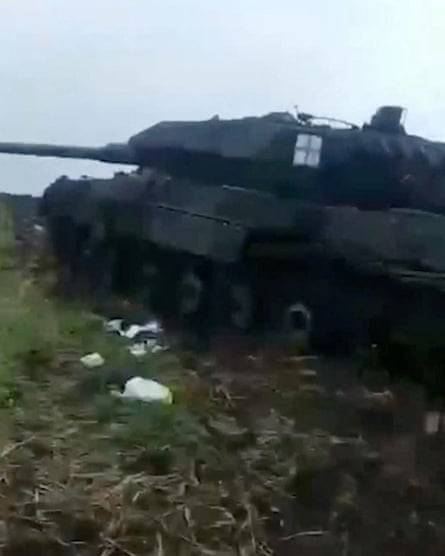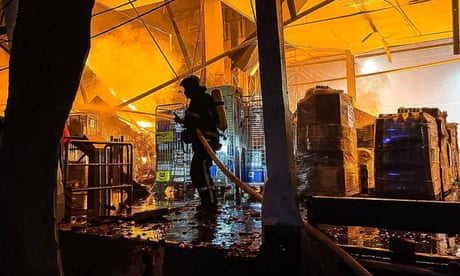Guardian:
Ukraine’s failed Mala Tokmachka assault lays bare counteroffensive challenges
Russia has had 12 months to prepare defensive positions supported by superior air power
Thu 15 Jun 2023 01.38 AEST

The footage that began circulating on Russian social media channels last week depicted what was portrayed as a significant military setback for Ukraine at the beginning of its counteroffensive.
In a flat, open area south of Zaporizhzhia – bisected by hedges and a wide muddy track – about 12 Ukrainian armoured vehicles had become pinned down, bunched too close together near a minefield.
In one video, shells and rockets can be seen tearing into the ground and into vehicles, including one of Ukraine’s new German-supplied Leopard tanks and US Bradleys. Soldiers can be seen running through the smoke from one damaged vehicle to another.
When the shooting was finally over, several Ukrainian soldiers were dead. Smashed vehicles had been left abandoned. Russian commentators were crowing over the failure.
The two sides have given conflicting accounts of what happened on the afternoon of 7 June, about 4km south of the village of Mala Tokmachka, with Moscow almost certainly overemphasising the importance of the engagement and Kyiv attempting to downplay it. Only now, amid the fog of war, is it possible to ascertain what happened.
As part of a wider effort in that area of the frontline, 20 Ukrainian armoured vehicles led by two specialised mine-clearing vehicles set off in what appears to have been a “breaching operation”, targeting an area of higher ground held by Russian forces.
Not long afterwards, brief posts on social media described how the column ran into difficulty close to a minefield, losing many of its vehicles.

A still from video released by the Russian defence ministry of a Leopard tank captured by Russian forces in Zaporizhzhia. Photograph: Russian Defence Ministry/Reuters
According to analysis by Deepstatemap, which tracks the status of the fighting in Ukraine, Kyiv’s forces attempted two separate attacks, the first involving nine vehicles, the second 11.
It appears the first group encountered mines, which alerted Russian defenders to their presence. The second group was quickly spotted by Russian reconnaissance drones and came under heavy artillery fire.
At some stage it appears that four Bradleys – possibly from the second group – were sent to help retrieve troops from where they had been pinned down.
According to Ukrainian accounts, the Russian fire led to the loss of one Leopard tank and four armoured personnel carriers. Other vehicles, including a second Leopard, appear to have been damaged. There are claims that this tank too was abandoned.
Despite efforts by Russian sources to suggest a wider setback for Ukrainian forces in the area, it appears that much of the footage that emerged in the aftermath showed the same engagements from different angles.
According to staff sergeant Valerii Markus of the Ukrainian 47th brigade – which was involved in the incident – Russia had hugely exaggerated the brigades’ losses. In a video posted online this week, a visibly angry Markus said his brigade had lost five soldiers, not the large numbers claimed by Russia, and had inflicted far heavier losses on the Russian side.
“It’s hard for our soldiers,” he said, aiming his anger at critics of what had occurred, “but they are fighting. They are recovering our land metre by fucking metre.”
The details of the failed assault remain important because of what they reveal about the challenges Ukraine’s counteroffensive faces against defensive positions Russia has had a year to prepare that are supported by Moscow’s superior air power, which has been more visible since Ukraine began its offensive.
Commenting on the events around Mala Tokmachka in an update in his Substack account, Phillips P O’Brien, professor of strategic studies at the University of St Andrews, suggested that such losses were to be expected because of the nature of the fighting.
“It’s clear that this operation will take a while. Ukraine is trying to do something that has not been successfully accomplished (perhaps ever) before. They are trying to execute a wide-scale offensive with the use of armoured vehicles without air supremacy against an entrenched enemy that possesses a large supply of defensive weaponry.

“Many of the advantages Ukraine was able to use effectively in slowing any Russian advances to slower-than-snail pace over the last six months are now with the Russians.
“The Ukrainians are having to contend with the fact that now they need to send forces forward, including tanks, APCs and other vehicles, and they must operate in an environment in which they are threatened by a large number of different systems – such as the almost ubiquitous handheld anti-vehicle missile.”
That sentiment was underlined in a briefing from western officials on Wednesday that suggested Ukraine was taking significant casualties and making slow progress towards the Russian main line of defence.
They said the counteroffensive was still in its early days and involved a form of warfare not seen in decades as Ukraine forces were being forced to build single lanes of armoured vehicles through mines heading to main Russian defences that in some cases may be still as far as 20km away.
“The vulnerability of the classic single lanes through the minefields make the Ukrainian armoury very vulnerable to attack,” one official said.
The officials suggested there was likely to be “grinding, costly warfare” for many months to come.
“This is incredibly difficult. Russia has generally put up a good defence from their well-prepared positions and falling back to tactical lines … The idea that the Russians were just going to melt away and the Ukrainians were going to drive straight through their defensive line was in people’s wildest dreams.”
According to analysis by Deepstatemap, which tracks the status of the fighting in Ukraine, Kyiv’s forces attempted two separate attacks, the first involving nine vehicles, the second 11.
It appears the first group encountered mines, which alerted Russian defenders to their presence. The second group was quickly spotted by Russian reconnaissance drones and came under heavy artillery fire.
At some stage it appears that four Bradleys – possibly from the second group – were sent to help retrieve troops from where they had been pinned down.
According to Ukrainian accounts, the Russian fire led to the loss of one Leopard tank and four armoured personnel carriers. Other vehicles, including a second Leopard, appear to have been damaged. There are claims that this tank too was abandoned.
Despite efforts by Russian sources to suggest a wider setback for Ukrainian forces in the area, it appears that much of the footage that emerged in the aftermath showed the same engagements from different angles.
According to staff sergeant Valerii Markus of the Ukrainian 47th brigade – which was involved in the incident – Russia had hugely exaggerated the brigades’ losses. In a video posted online this week, a visibly angry Markus said his brigade had lost five soldiers, not the large numbers claimed by Russia, and had inflicted far heavier losses on the Russian side.
“It’s hard for our soldiers,” he said, aiming his anger at critics of what had occurred, “but they are fighting. They are recovering our land metre by fucking metre.”
The details of the failed assault remain important because of what they reveal about the challenges Ukraine’s counteroffensive faces against defensive positions Russia has had a year to prepare that are supported by Moscow’s superior air power, which has been more visible since Ukraine began its offensive.
Commenting on the events around Mala Tokmachka in an update in his Substack account, Phillips P O’Brien, professor of strategic studies at the University of St Andrews, suggested that such losses were to be expected because of the nature of the fighting.
“It’s clear that this operation will take a while. Ukraine is trying to do something that has not been successfully accomplished (perhaps ever) before. They are trying to execute a wide-scale offensive with the use of armoured vehicles without air supremacy against an entrenched enemy that possesses a large supply of defensive weaponry.

“Many of the advantages Ukraine was able to use effectively in slowing any Russian advances to slower-than-snail pace over the last six months are now with the Russians.
“The Ukrainians are having to contend with the fact that now they need to send forces forward, including tanks, APCs and other vehicles, and they must operate in an environment in which they are threatened by a large number of different systems – such as the almost ubiquitous handheld anti-vehicle missile.”
That sentiment was underlined in a briefing from western officials on Wednesday that suggested Ukraine was taking significant casualties and making slow progress towards the Russian main line of defence.
They said the counteroffensive was still in its early days and involved a form of warfare not seen in decades as Ukraine forces were being forced to build single lanes of armoured vehicles through mines heading to main Russian defences that in some cases may be still as far as 20km away.
“The vulnerability of the classic single lanes through the minefields make the Ukrainian armoury very vulnerable to attack,” one official said.
The officials suggested there was likely to be “grinding, costly warfare” for many months to come.
“This is incredibly difficult. Russia has generally put up a good defence from their well-prepared positions and falling back to tactical lines … The idea that the Russians were just going to melt away and the Ukrainians were going to drive straight through their defensive line was in people’s wildest dreams.”
No comments:
Post a Comment